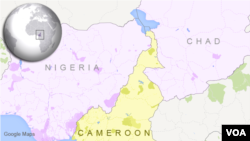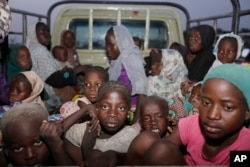The governor of the Far North region of Cameroon says a local self-defense group was able to prevent an attack by Boko Haram against Christians getting ready to celebrate Christmas, a sign that the militant group remains a danger in the region.
Governor Midjiyawa Bakari said members of a self-defense group detected a suspected Boko Haram fighter riding his bicycle toward an area in the town of Mora, on Cameroon's northern border with Nigeria, where Christians were assembling for Christmas Mass on Sunday.
Bakari said when the vigilantes tried to search the man, he immediately detonated his explosives, killing himself and a nearby civilian by the name of Ibrahim Mahama.
He said two members of the self-defense group were also killed. One died at the scene while another died later at a hospital. He said at least eight other people were also wounded in the suicide bomb attack.
Local media also reported three other armed attacks occurred on Sunday at Fotokol, Belgede and Madam, all on Cameroon’s northern border with Nigeria. The attacks reportedly left several wounded.
The fresh violence comes two days after Nigeria President Muhammadu Buhari announced troops had chased Boko Haram militants out of their key remaining base in the Sambisa forest. The forest straddles Cameroon’s border with Nigeria.
While Buhari said the militants have been crushed in northeast Nigeria, towns just across the border in northern Cameroon saw a string of attacks, underscoring the continued threat, Bakari said.
He urged residents to remain vigilant to the threat posed by Boko Haram and used as an example the string of attacks.
Bakari said the suicide bomber would have attacked a church had he not been identified and stopped by the local self-defense group.
However, in a sign of progress against the Boko Haram militants, Cameroon and Nigeria earlier this month pointed to the reopening of the border between the two countries — for the first time in three years.
Boko Haram's six-year insurgency has killed more than 25,000 people and displaced nearly 2.3 million, according to rights groups and the United Nations.







